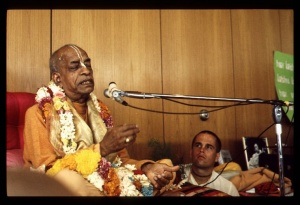SB 1.7.18: Difference between revisions
m (1 revision(s)) |
No edit summary |
||
| Line 1: | Line 1: | ||
{{info | {{info | ||
|speaker= | |speaker=Sūta Gosvāmī | ||
|listener=Sages of | |listener=Sages of Naimiṣāraṇya | ||
}} | }} | ||
[[Category:Srimad-Bhagavatam - Canto 01 Chapter 07]] | |||
[[Category:Bhagavatam Verses Spoken by Suta Gosvami - Vanisource|010718]] | |||
<div style="float:left">'''[[Srimad-Bhagavatam]] - [[SB 1|First Canto]] - [[SB 1.7: The Son of Drona Punished|Chapter 7: The Son of Droṇa Punished]]'''</div> | |||
<div style="float:right">[[File:Go-previous.png|link=SB 1.7.17]] '''[[SB 1.7.17]] - [[SB 1.7.19]]''' [[File:Go-next.png|link=SB 1.7.19]]</div> | |||
{{CompareVersions|SB|1.7.18|SB 1964|SB 1972-77}} | |||
{{RandomImage}} | |||
==== TEXT 18 ==== | ==== TEXT 18 ==== | ||
<div | <div class="verse"> | ||
tam āpatantaṁ sa vilakṣya dūrāt | :tam āpatantaṁ sa vilakṣya dūrāt | ||
kumāra-hodvigna-manā rathena | :kumāra-hodvigna-manā rathena | ||
parādravat prāṇa-parīpsur urvyāṁ | :parādravat prāṇa-parīpsur urvyāṁ | ||
yāvad-gamaṁ rudra-bhayād yathā kaḥ | :yāvad-gamaṁ rudra-bhayād yathā kaḥ | ||
</div> | </div> | ||
| Line 17: | Line 23: | ||
==== SYNONYMS ==== | ==== SYNONYMS ==== | ||
<div | <div class="synonyms"> | ||
''tam''—him; ''āpatantam''—coming over furiously; ''saḥ''—he; ''vilakṣya''—seeing; ''dūrāt''—from a distance; ''kumāra-hā''—the murderer of the princes; ''udvigna-manāḥ''—disturbed in mind; ''rathena''—on the chariot; ''parādravat''—fled; ''prāṇa''—life; ''parīpsuḥ''—for protecting; ''urvyām''—with great speed; ''yāvat-gamam''—as he fled; ''rudra-bhayāt''—by fear of Śiva; ''yathā''—as; ''kaḥ''—Brahmā (or ''arkaḥ''—Sūrya). | |||
</div> | </div> | ||
| Line 24: | Line 30: | ||
==== TRANSLATION ==== | ==== TRANSLATION ==== | ||
<div | <div class="translation"> | ||
Aśvatthāmā, the murderer of the princes, seeing from a great distance Arjuna coming at him with great speed, fled in his chariot, panic stricken, just to save his life, as Brahmā fled in fear from Śiva. | Aśvatthāmā, the murderer of the princes, seeing from a great distance Arjuna coming at him with great speed, fled in his chariot, panic stricken, just to save his life, as Brahmā fled in fear from Śiva. | ||
</div> | </div> | ||
| Line 31: | Line 37: | ||
==== PURPORT ==== | ==== PURPORT ==== | ||
<div | <div class="purport"> | ||
According to the reading matter, either kaḥ or arkaḥ, there are two references in the Purāṇas. Kaḥ means Brahmā, who once became allured by his daughter and began to follow her, which infuriated Śiva, who attacked Brahmā with his trident. Brahmājī fled in fear of his life. As far as arkaḥ is concerned, there is a reference in the Vāmana Purāṇa. There was a demon by the name Vidyunmālī who was gifted with a glowing golden airplane which traveled to the back of the sun, and night disappeared because of the glowing effulgence of this plane. Thus the sun-god became angry, and with his virulent rays he melted the plane. This enraged Lord Śiva. Lord Śiva then attacked the sun-god, who fled away and at last fell down at Kāśī (Vārāṇasī), and the place became famous as Lolārka. | According to the reading matter, either ''kaḥ'' or ''arkaḥ'', there are two references in the ''Purāṇas''. ''Kaḥ'' means Brahmā, who once became allured by his daughter and began to follow her, which infuriated Śiva, who attacked Brahmā with his trident. Brahmājī fled in fear of his life. As far as ''arkaḥ'' is concerned, there is a reference in the ''Vāmana Purāṇa''. There was a demon by the name Vidyunmālī who was gifted with a glowing golden airplane which traveled to the back of the sun, and night disappeared because of the glowing effulgence of this plane. Thus the sun-god became angry, and with his virulent rays he melted the plane. This enraged Lord Śiva. Lord Śiva then attacked the sun-god, who fled away and at last fell down at Kāśī (Vārāṇasī), and the place became famous as Lolārka. | ||
</div> | </div> | ||
__NOTOC__ | |||
<div style="float:right; clear:both;">[[File:Go-previous.png|link=SB 1.7.17]] '''[[SB 1.7.17]] - [[SB 1.7.19]]''' [[File:Go-next.png|link=SB 1.7.19]]</div> | |||
__NOTOC__ | |||
__NOEDITSECTION__ | |||
Revision as of 11:15, 30 April 2021

A.C. Bhaktivedanta Swami Prabhupada
TEXT 18
- tam āpatantaṁ sa vilakṣya dūrāt
- kumāra-hodvigna-manā rathena
- parādravat prāṇa-parīpsur urvyāṁ
- yāvad-gamaṁ rudra-bhayād yathā kaḥ
SYNONYMS
tam—him; āpatantam—coming over furiously; saḥ—he; vilakṣya—seeing; dūrāt—from a distance; kumāra-hā—the murderer of the princes; udvigna-manāḥ—disturbed in mind; rathena—on the chariot; parādravat—fled; prāṇa—life; parīpsuḥ—for protecting; urvyām—with great speed; yāvat-gamam—as he fled; rudra-bhayāt—by fear of Śiva; yathā—as; kaḥ—Brahmā (or arkaḥ—Sūrya).
TRANSLATION
Aśvatthāmā, the murderer of the princes, seeing from a great distance Arjuna coming at him with great speed, fled in his chariot, panic stricken, just to save his life, as Brahmā fled in fear from Śiva.
PURPORT
According to the reading matter, either kaḥ or arkaḥ, there are two references in the Purāṇas. Kaḥ means Brahmā, who once became allured by his daughter and began to follow her, which infuriated Śiva, who attacked Brahmā with his trident. Brahmājī fled in fear of his life. As far as arkaḥ is concerned, there is a reference in the Vāmana Purāṇa. There was a demon by the name Vidyunmālī who was gifted with a glowing golden airplane which traveled to the back of the sun, and night disappeared because of the glowing effulgence of this plane. Thus the sun-god became angry, and with his virulent rays he melted the plane. This enraged Lord Śiva. Lord Śiva then attacked the sun-god, who fled away and at last fell down at Kāśī (Vārāṇasī), and the place became famous as Lolārka.